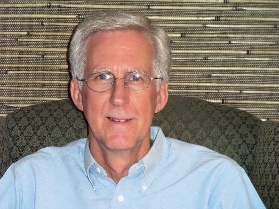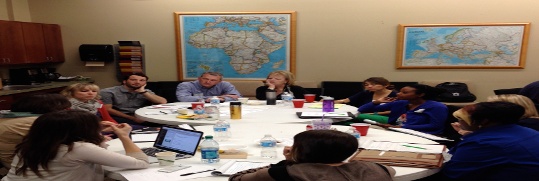For Houston's Kids: Beyond Church and Public School Partnerships
Steve Capper (pictured below and featured in a 2:40 minute video below) is a GoodCities Community Leadership Coach and serves as the Executive Director of For Houston’s Kids. He will be a contributing blogger for our blog site. This article introduces the missional thrust of how this unique collaboration between people of faith and people of good will works together for the good of Houston’s children. For Houston’s Kids goes beyond church and public school partnerships by forming unlikely partnerships to accomplish their goals.
 In 2004, a healing of many in the Church of Houston who were blind began. Like the story told in Mark 8, the restoration of sight was both partially immediate and largely progressive. This miracle followed a simple question, a group conversation, and a massive investigation in search of an accurate picture of our city’s condition.
In 2004, a healing of many in the Church of Houston who were blind began. Like the story told in Mark 8, the restoration of sight was both partially immediate and largely progressive. This miracle followed a simple question, a group conversation, and a massive investigation in search of an accurate picture of our city’s condition.
Dave Peterson, then the Senior Pastor of Memorial Drive Presbyterian Church, had attended a one-day conference featuring a stirring story of one man’s efforts to replace isolation and hopelessness among Baltimore’s inner city youth with caring mentors and a path to a hopeful future. On the way home, Dave found himself pondering a suddenly appearing thought: “What would it take for Houston to be as world famous for every neighborhood and school producing whole and healthy children as we are for NASA, the oil and gas industry, and the world’s largest medical center?” Whatever the answer, Dave realized, it would take the Church … and not just the Church. Weeks later, Dave shared his experience with a group of 25 pastors and ministry leaders. The room went noticeably silent and still, as if God had shown up and Himself asked us the question. When words were again spoken, the sentiment was unanimous: this would not only be a goal worth giving our best efforts and resources to, but would both bring tangible blessing to our neighbors and city for years to come and it would expand the Kingdom of God. As with the blind man whom Jesus touched, we were beginning to see, but the shapes were not yet clearly defined.
It just so happened that Mission Houston had months prior launched a citywide research effort to establish a baseline, the Houston Profile Project. Utilizing the expertise of Baylor University’s Center for Community Research & Development, conducting interviews with leaders in 45 clusters of communities, and deploying volunteers in three- or four-to-a-car “windshield survey” teams to make notes of their neighborhoods, our primary initial interest was in determining both the objectively verifiable places of societal brokenness in our metropolitan area and the most widespread “felt needs” of our neighbors so that the Church of Houston would know without guessing where our serving would have the highest impact.
One finding confirmed what we had not yet seen: the single most pervasive needs found in all 45 areas of the city, and reported by both people of faith and those of no active faith, centered on concerns for the present and future of kids. Further, one characteristic of the rapidly changing demographic face of the city was this: the number of at-risk kids in our city was multiplying far faster than the number of human, financial, educational, and health resources being allocated to them. In spite of great efforts within and beyond the faith community, more and more kids faced an unhealthy present and a predictably grim future. One prominent sociologist in the city even declared that Houston was on the verge of becoming a third world city, whose employers had to import their workforce because the kids of Houston were not adequately prepared. And now, as with the blind man in Mark 8, the plight of kids right before our eyes came into increasingly clear focus. We would never again be able to not see what was now crystal clear.
Fast forward almost ten years. The terms “collective impact” and “movement” are more common than their reality, but they provide language for the quest we remain focused on – to adequately address the needs of kids here in Houst
on so they have a likelihood of a future with a hope. After five years of multiplying mentors in the public schools, and after over two years of one-on-one conversations with leaders of hundreds of organizations working with or for children and youth, Mission Houston joined the YMCA, Big Brothers Big Sisters, Catholic Charities, and others to birth in October 2013 a new initiative that seeks to add 250,000 new volunteers to maximize the efforts of service providers who are committed to addressing together the physical, emotional, educational, and spiritual needs of those age 0-19. Called simply “For Houston’s Kids,” this fledgling undertaking is not faith-based, but it is faith community friendly.
And it has no guaranteed success. There are significant obstacles … challenges … that loom large. In the non-profit and government sector, and sadly even in the world of the Church, we have too little experience of or appetite for shared efforts and joint credit. In the Church, there are still many who believe that if an organization is not specifically faith-based and names Jesus as our reason for being then the work undertaken does not contain “the gospel.” But those of us engaged inside the Church and the wider community building relationships and casting the vision believe the work of sowing the seeds of Church unity (people of good faith) working in intentional partnership with anyone who cares about the well-being of our kids (people of good will) is worthy of our best efforts. You see, it’s not for or about us, or the organization. It’s “for Houston’s kids!”
We request your prayers. We ask you to connect us with anyone in the city you know who yearns to see kids well-educated and healthy in every way. And we’ll keep you posted on progress towards the God-sized goal, whether that includes fruit through our organization or not.


 Earlier this week, March 31-April 1, I had the privilege of leading the South Central GoodCities Leadership Gathering. This year it was an all Texas affair held at
Earlier this week, March 31-April 1, I had the privilege of leading the South Central GoodCities Leadership Gathering. This year it was an all Texas affair held at